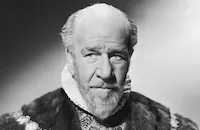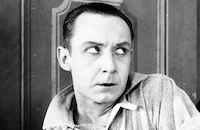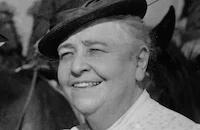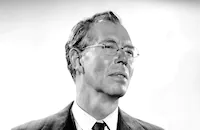Reckless Age
Cast & Crew
Felix E. Feist
Gloria Jean
Henry Stephenson
Kathleen Howard
Franklin Pangborn
Andrew Tombes
Film Details
Technical Specs

Synopsis
After her graduation recital, heiress Linda Wadsworth is given a string of pearls by her grandfather, J. H. Wadsworth, the dime store king. When J. H. tells Linda his detailed plans for her life, she attempts to join the armed forces, but is refused for being underage. Later, Linda runs away from home and sneaks aboard a train to Boston. Linda is taken off the train in the small town of Hammettsville, where she quickly attains a job at one of her grandfather's stores, under the alias of Laura Weston. When Mr. Thurtle, the assistant store manager, discovers Linda writing her grandfather, he and Mr. Cook, the store manager, assume that she is a company investigator and do their best to please her. Later, Linda moves into a boardinghouse run by the Connors family, and soon falls for Roy Connors, who is one of her coworkers at the dime store. Meanwhile, J. H., angry about his missing granddaughter, demands that all his stores improve business. During a staff meeting of the Hammettsville store, Linda makes a series of suggestions that Thurtle and Cook immediately institute, which lead to greater morale and productivity among the salesclerks. A few days later, Linda sells her gold bracelet to a soldier for one dollar, but Roy and salesclerk Sandra Sibelius think she is stealing when she keeps the dollar instead of placing it in the cash register. That night, Roy confronts Linda about the "theft," and she angrily accuses him of having no faith in her. Knowing that Mr. and Mrs. Connors are feuding over his raising pigs in her "victory garden," Linda convinces Thurtle and Cook to buy the pigs and give them away as a promotion for Wadsworth's Stores' fiftieth anniversary sale. The promotion is a great success until one of the customers drops her dog among the pigs, and the loose animals cause a riot which nearly destroys the store. Cook is ordered to New York to explain matters to J. H., and the department store king quickly realizes that the "company investigator" is his granddaughter. Learning that her grandfather is on his way to Hammettsville, Linda attempts to run away again, but Roy, still thinking that she is a thief, catches her and insists that she turn herself over to the police. Thinking that she can hide from her grandfather in jail, Linda falsely confesses to stealing the necklace under the alias "Lucy Waters." J. H. stills manages to find her, but, discovering what a great success she has been, he agrees to let her live her own life. On her eighteenth birthday, Linda joins the Women's Ambulance Corps, and at a party in her honor, Roy gives her a coded messaged that reads "I Love You."

Director
Felix E. Feist
Cast

Gloria Jean

Henry Stephenson
Kathleen Howard

Franklin Pangborn
Andrew Tombes

Marshall Thompson

Jane Darwell
Lloyd Corrigan

Judy Clark

Jack Gilford
Chester Clute
Harold Nicholas
The Delta Rhythm Boys
Linda Reed
Karen Knight
Marie Harmon
Kate Harrington
Alice Fleming
James Mcgowan
Beverly Paysee
Connie Leon
Ida Moore
Tom Rafferty
Charles King
Charles Jordan
George Humbert
Ernest Golm

Ian Wolfe
Elspeth Dudgeon
David Holt
Don Hayden
Earle Dewey
Gladys Blake
Marion Douglas
Pearl Early
Eula Morgan
John Whitney
Carlyle Blackwell Jr.

Walter Baldwin
Ben Erway
Bonnie Jean Tait
Anitra Sparrow
Beatrice Roberts
Carl O'bryan
Ethel May Halls
Bobby Barber
Odessa Lauren
Crew
Luigi Arditi
Jerome Ash
Irving Bibo
Henry Blankfort
Johannes Brahms
Bernard B. Brown
Charles Carroll
Teodoro Cottrau
William Crago
Ray Curtiss
Felix E. Feist
Sam Freed Jr.
Russell A. Gausman
John B. Goodman
Jararaca
Harold H. Macarthur
Al Martin
Jorge Negrete
Vicente Paiva
Gene De Paul
Gertrude Purcell
Don Raye
Milton Schwarzwald
Grace Shannon
Al Stillman
Ira S. Webb
Seward Webb
Vera West

Film Details
Technical Specs

Articles
Fayard Nicholas (1914-2006)
Born on October 20, 1914 in Mobile, Alabama, Fayard was the son of musicians who played in vaudeville pit orchestras. When he was 6 1/2 years of age, his younger brother Harold was born (March 27, 1921, Winston-Salem, North Carolina) and little did they realize that they were destined to be one of the most memorable dance duos in film history.
Fayard learned to dance by watching several vaudeville shows while traveling with his parents. He incorporated many of the acrobatic moves he saw into his own routines, and soon, Harold was learning with him. By 1932, they had auditioned, and landed, a spot in Harlem's celebrated haunt, The Cotton Club. Their routines were a sensation, and Samuel Goldwyn brought them to Hollywood where they performed in Kid Millions (1934) with Eddie Cantor and The Big Broadcast of 1936 (1937). That same year, they appeared on Broadway The Ziegfeld Follies of 1936 and Babes in Arms.
Fayard and Harold headed back to The Cotton Club to polish up their moves, and when they came back to Hollywood in the '40s, they entered their golded period. In Down Argentina Way (1940) starring Don Ameche and Betty Grable, they did that extraordinary number, leaping off a grand piano and doing eye-popping splits over each other on an oversized staircase; Sun Valley Serenade (1941), they have an engaging Chattenooga Choo-Choo routine with a 19-year-old Dorothy Dandridge; and best of all, The Pirate (1948) where they do a terrific Be a Clown routine with Gene Kelly that's every bit as comical as it was inventive.
In the early '50s, the brothers were touring all over the United States and Europe, but in 1957, Harold spent seven years in Paris and only reunited with Fayard in a 1964 television appearance on the hit variety show The Hollywood Palace. But as their performance teaming became less frequent as they got older, Fayard found ways to keep busy. He drew critical praise for his dramatic turn in The Liberation of L.B. Jones (1970) and won a Tony for his choreography for Black and Blue (1989). In 1991, Both Fayard and Harold received the Kennedy Center Honors and most deserved honory Oscars® at the Academy Awards. Nicholas is survived by his wife, Katherine; sister, Dorothy; sons, Tony and Paul; four grandchildren; and a great-granddaughter.
by Michael T. Toole

Fayard Nicholas (1914-2006)
Quotes
Trivia
Notes
The working title of this film was Make Way for Love. According to Hollywood Reporter, Richard Sanders, the eight-month-old nephew of actress Gloria Jean, was slated to appear in this film, but his appearance in the released film has not been confirmed.














